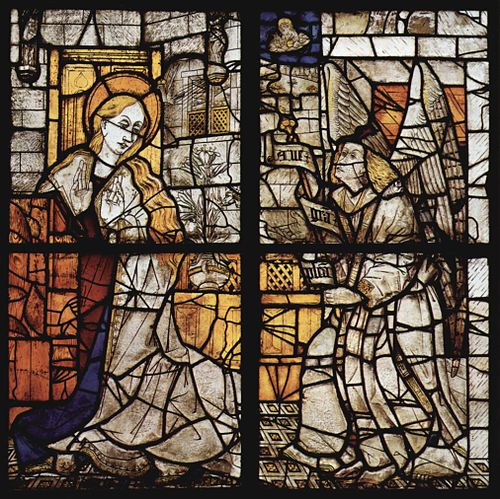Advent Sunday 4 (18 Dec 2011)
Homily of Fr. Paul Panaretos, S.J.
Reconciled By the Incarnation
Today’s liturgy and its scripture selections shape our immediate preparation to celebrate our Savior’s birth. The opening prayer reminded us that our celebration of God’s birth among us also asks God that “[Jesus’] Passion and Cross…[may bring us] to the glory of his Resurrection”1 and our participation in it. One way this divine-human participation functions is reconciliation. A brief word on the Incarnation as reconciling us to God.
St. Ignatius of Loyola imagined the Incarnation as flowing from the heart of the Trinity from their eternity. He invited us to consider the Divine Persons gazing upon the surface of the earth
seeing humans being born and dying, loving and hating, happy and sad, flourishing and struggling, “so many people aimless, despairing, hateful and killing; so many undernourish-ed, sick and dying, so many struggling with life and blind to any meaning. With God I can hear people laughing and crying, some shouting and screaming, some praying, others cursing.”2 That is an accurate assessment of things today.
seeing humans being born and dying, loving and hating, happy and sad, flourishing and struggling, “so many people aimless, despairing, hateful and killing; so many undernourish-ed, sick and dying, so many struggling with life and blind to any meaning. With God I can hear people laughing and crying, some shouting and screaming, some praying, others cursing.”2 That is an accurate assessment of things today.
Staying close to reality allows us to be real about God. God is not an idea. God is our Creator and Redeemer. God’s intimate desire to remain involved with creation and fulfill it Ignatius expressed this way: the Divine Persons “decide in their eternity that the Second Person should also become a human being to save the human race.”3
The Incarnation is about us! God in Jesus by their Spirit desired to restore our original dignity to us. That restoration shapes our vocation in life. Each of us begins with oneself. Whom do I love? What is alive in me? What do I nourish? What gives me meaning? As one considers these gracious gifts, their opposites surface in our minds and hearts: Who irritates me, or worse? What is not life-giving for me? What do I neglect or refuse to cultivate within me? How do I squander my gifts and my purpose in life?
When we are honest about ourselves this way, then we open ourselves to the mystery of God working in us, with us and for us. We notice more clearly how each of us is an image of our Creator and Redeemer, and we tend to see others that way. We also—and this is often a steeper challenge—we notice our need to be saved. We increasingly dispose ourselves to know in a felt way that Jesus is our Savior.
The more honest we are about ourselves, the more compassionate we become. Things that seemed too much for us we see in truer perspective. Our worries and fears do not evaporate, although our confidence to contend with them increases. We grow more alert that by Holy Spirit our Savior is with us wherever we may be. As we cultivate this awareness through daily moments of quiet, prayer and celebrating the sacraments, especially the Eucharist, our personal confidence flows into our daily living. We desire others to enjoy it.
The Incarnation is the most exquisite relationship. Over 1500 years ago Pope St. Leo wrote that “divine nature and the nature of a servant were…united in one person.”4 The service of the Incarnation is twofold: first, to restore us, reconcile us to our true and original dignity as images of God; and second, to deepen our relationship with God and restore our relationship with each other.
The Incarnation is the most exquisite relationship. Over 1500 years ago Pope St. Leo wrote that “divine nature and the nature of a servant were…united in one person.”4 The service of the Incarnation is twofold: first, to restore us, reconcile us to our true and original dignity as images of God; and second, to deepen our relationship with God and restore our relationship with each other.
The Incarnation has many practical effects. One is the desire for others to enjoy it, to make it known to all. Evangelizing—passing on our Incarnation faith by our choices and behaviors and styles of living—deepens our relationship with God and makes us ambassadors of reconciliation5 day to day.
In your 15 minutes with Jesus this week
- Pause in the love of the Trinity.
- Ask Mary to present you to her Son.
- In your words thank Jesus, our Divine Savior, for becoming human for you.
- Ask him to increase your confidence in his presence with you and deepen your felt knowledge of his presence.
- Close by saying slowly the Lord’s Prayer. Jesus gave us his prayer so that we may grow more confident that his union with us and us with him through his Incarnation will bring us to the glory of his Resurrection.
Link to this homily’s Spiritual Exercise
____________
- Roman Missal, Fourth Sunday of Advent.
- This paraphrase of St. Ignatius belongs to James L. Fleming, S.J., Draw Me Into Your Friendship: The Spiritual Exercises: A Literal Translation & A Contemporary Reading. St. Louis: IJS, 1996, p. 91.
- Spiritual Exercises of Saint Ignatius, trans. & comm. George E. Ganss, S.J., St. Louis: IJS, 1992, p. 56 [at #102].
- Letter 31, which is excerpted in the Liturgy of the Hours on 17 December.
- The language is St. Paul’s. See 2Corinthians 5.16-21.
_____________________________________________________________________
Wiki-image by 3268zauber of an Advent wreath is used according to the CC BY-SA 3.0 license. Wiki-image of an Annunciation window is in the public domain.


No comments:
Post a Comment